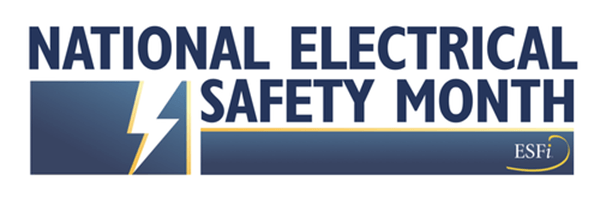May is National Electrical Safety Month, and the Electrical Safety Foundation International (ESFI) reminds us that disasters bring serious risks for electrical-related issues. This year’s campaign theme, “Electrical Safety During Natural Disasters,” focuses on the importance preparing, weathering, and rebuilding after natural disasters.
Keep these tips in mind before, during and after severe storms and other natural disasters:
PREPARE FOR THE STORM
- Charge all phone and communications devices.
- Move computers and other electronic devices to countertops or tables to avoid water damage from flooding.
- Turn off circuit breakers to avoid power surges.
- If you plan to use a portable generator during the storm, ensure that a qualified electrician has installed it and make sure to use a listed and approved transfer switch and GFCI (Ground Fault Circuit Interrupter) protection.
WEATHER THE STORM
- Stay indoors during hurricanes and away from windows and glass.
- Never operate a portable generator inside your home or garage.
- Do not connect generators directly to the household wiring unless an appropriate transfer switch has been installed by a licensed, qualified electrician.
- Always use GFCIs in areas where water and electricity may come in contact. The National Electrical Code (NEC) currently requires that GFCIs be installed in all kitchens, bathrooms, garages, outdoors, and within six feet of any sink.
RECOVER FROM THE STORM
- Have a qualified electrician inspect any water-damaged electrical equipment and electronics. Electrical items, such as circuit breakers, fuses, GFCIs, receptacles, plugs and switches, can malfunction when water and silt get inside. Discard them if they have been submerged.
- If flooding has occurred, have a qualified electrician inspect your electrical system.
- Do not touch a circuit breaker or replace a fuse with wet hands or while standing on a wet surface.
- Report and stay away from downed power lines and always assume they are energized. Never touch a person or object that is in direct or indirect contact with a downed power line, such as a fence, tree limb or water. Instead, call 911 immediately.
- Avoid flooded areas as they may be electrified. Even nonconductive materials like wood or cloth that are slightly wet can conduct electricity.
- If you smell gas, notify emergency authorities immediately. Do not turn on lights, light matches or engage in any activity that could create a spark.
For additional electrical safety resources, visit http://www.esfi.org/.








